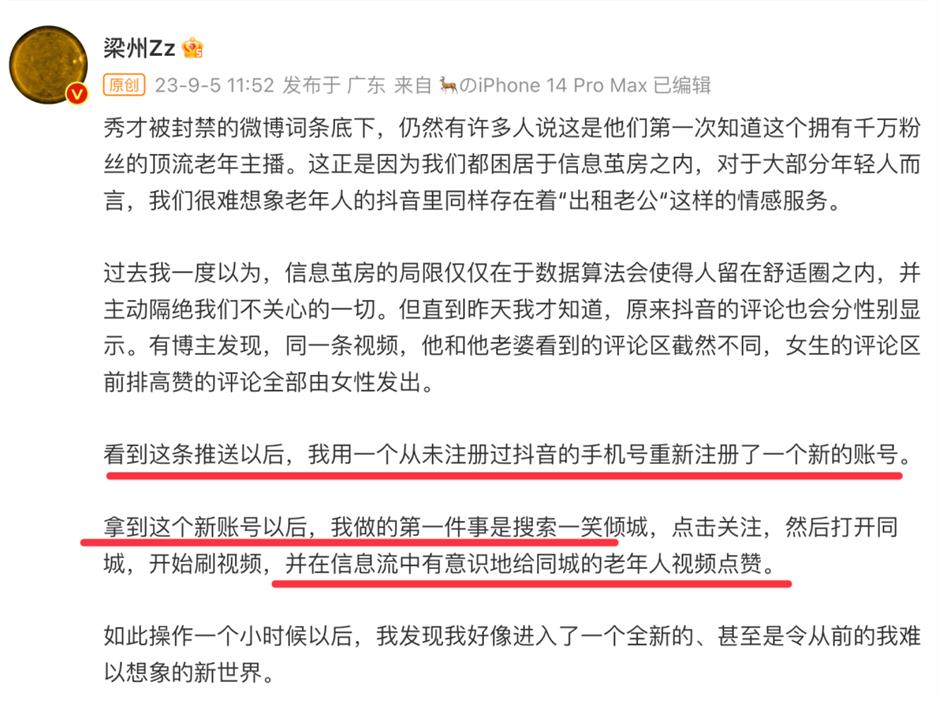Douyin's gender-tailored comments sections spark controversy
Many may have heard the term information cocoon. However, not everyone is familiar with how it works.
Information cocoons, which also go by the name of "echo chambers," create an environment in which people only encounter voices that express opinions and ideas similar to their own, according to Keith Sunstein, an American scholar.
A video posted on short-video platform Douyin, or the Chinese version of TikTok, last week has sparked widespread online discussion on echo chambers. The video shows a man from Shaanxi Province checking the comments sections of another video, where a couple is arguing, in which the woman selectively hears the man's reasoning as to why it's not his fault that the woman is angry.
The original skit video where the woman selectively hears what the man reasons.
Having watched the video, the man then checked his girlfriend's Douyin for the same video. Surprisingly, the comments section on her account was totally different. The top posts in the comments section of the man's account were all left by men, and vice versa.

The comments sections for the same video are different for the man (left) and the woman (right) on the Douyin app.
After observing the different comments sections for men and women for the video, Liang Zhou, a blogger on Weibo.com, shared her findings on the issue.
To make sure that Douyin will recommend varied content and comments to users of different genders and preferences, Liang registered a new account on the platform, in which she deliberately searched for and liked content that aged users might like.
Following an hour spent scrolling the content suggested by the app, Liang found a virtual new world. Almost all the videos recommended and the random live voice chat the app connected for her were all elderly people.

Liang wrote about her findings on the different comments sections shown on her varied Douyin accounts.
However, after Liang switched to her own Douyin account to check one of the earlier videos, the comments section had changed completely.
Tech media outlet Chapingjun tested to see if its workers got different comment sections as registered male and female Douyin users.
Employees of Chapingjun checked videos from a beauty vlogger, a male health host, and a lawyer explaining topics such as dowry.
The comments sections of the one male and two female workers of Chapingjun were pretty much the same in the beauty vlogger and male health host's videos. But when it came to the lawyer talking on the controversial topic of dowry, the comments sections were again different.
Douyin's comments section is unlike other social media platforms such as Weibo, where users can choose to see the comments arranged by the number of likes and post time.

Weibo allows users to arrange the comments according to popularity or post time.
Still, Chapingjun was not able to judge if any algorithm was introduced to control what users see in the comments sections. Without the freedom to choose, it will no doubt lead users further into their own echo chamber and influence users' views.
If social media users are divided and grouped by their gender and interests, said Chapingjun, it will result in the disappearance of opposing ideas, which will only divide everyone further.

Chapingjun tested to see if the comments sections of the couple's argument are different on different people's phones.
Young social media users can access multiple sources and use different apps to receive all kinds of information, which makes it easier for them to get out of the echo chamber. However, things are a lot more difficult for middle-aged and elderly people.
There were about 119 million Internet users aged over 60 in the country as of December 2021, according to data released by the China Internet Network Information Center. Despite the fact that more than 50 percent of them are able to make online purchases, it is still worrisome that they still get their information from limited sources.
Information cocoons may directly predict depression among elderly social media users, as limited information sources can reduce social interaction, thus making the elderly more isolated and more prone to depression, according to a 2023 research on 400 Chinese seniors done by a group of Chinese researchers that was published on National Center for Biotechnology Information in the United States.
It is easy to search for video content on Douyin and other platforms rather than what should be presented to us. However, if the algorithm only shows our preferred comments, ideas and voices, then those voices that are different from our own may completely disappear on our personalized Internet.















